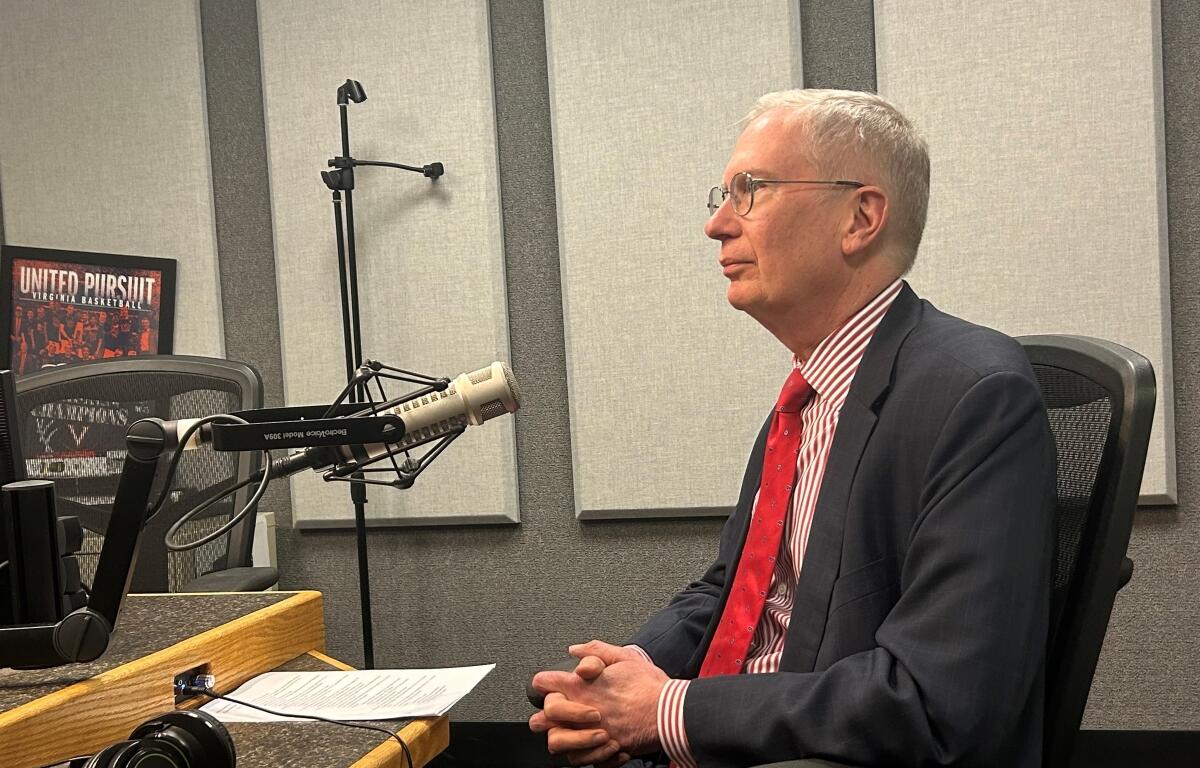CHARLOTTESVILLE VA (CVILLE RIGHT NOW) – With a Monday deadline to respond to the Trump Administration’s higher education compact looming, University of Virginia interim president Paul Mahoney said American universities would be facing a reckoning regardless of who was in the White House.
“It’s not just an issue of the current administration,” Mahoney told Cville Right Now. “We can’t just pretend that this is just a couple of people in the justice department or just a couple of people in the White House. This is a societal concern and we can either address it ourselves or we’re going to find that we’re getting more external pressure.”
Mahoney cited a Pew Research Center poll, released Wednesday, that found that 70% of respondents felt U.S. higher education was generally going in the wrong direction.
The poll showed that 45% say colleges and universities are doing a fair or poor job of exposing students to a wide range of opinions and viewpoints, while 79% said they’re doing a fair or poor job of keeping tuition costs affordable.
“So, this is not something that I think we can just ignore,” Mahoney said.
Mahoney took over as interim president in August, filling the vacancy left when former president Jim Ryan resigned under federal pressure from the Trump administration and the Department of Justice.
Mahoney worked quickly to address the DOJ investigations into UVA, some of which focused on the school’s use of diversity, equity and inclusion benchmarks in admissions and hirings. Two of the investigations were closed in September.
“I don’t think we’re in a particularly unique situation,” Mahoney said. “As I understand it, there may be around 40 different universities that are under some level of investigation by the Department of Justice. So, this is really an issue about higher education and not just the University of Virginia.”
UVA was one of nine schools that received a letter from the Trump administration asking it to sign on to the President’s “compact for academic excellence in higher education” in return for priority access to federal funding.
Mahoney said he’s “heard through the grapevine” that about six more schools have received that request since.
The 10-point plan demands schools eliminate diversity considerations from admissions and hirings, cut down on international student enrollment, freeze tuition, and share data on earnings of graduates.
UVA faculty and student groups have urged Mahoney not to sign the compact. Four of the original nine schools to receive the compact have already publicly rejected it – Brown University, University of Pennsylvania, the Massachusetts Institute of Technology and the University of Southern California.
Mahoney said he’s formed a working group to determine how UVA will respond.
“We’re supposed to provide comments by Oct. 20,” Mahoney said. “That process is ongoing. Of course, many faculty and students have weighed in with their opinions as well. I know that many of them are anxious and wish that I would just come out and say something immediately. I would just ask everyone to trust the process.”
Ultimately, Mahoney said the university will “respond in a way that is true to the Jeffersonian vision that animates the university.”
Mahoney said he’s had steady contact with the Department of Justice as he works to resolve the remaining investigations into the school.
“It’s like any negotiation. I have email and Zoom and other contacts with people at the Department of Justice,” Mahoney said. “We discuss ideas for resolving our remaining issues. I’m just trying to keep shepherding that process along.”
The school’s Board of Visitors is also in the process of hiring a permanent replacement for Ryan. While some have criticized the university for a lack of transparency around that hiring, Mahoney said it’s a fine needle to thread to ensure landing top-notch candidates.
“If you have a fully public search process, where people come in and everybody knows all of the candidates for the process, you don’t get the best people that way,” Mahoney said. “Because people who already have a very good position don’t necessarily want to say publicly, ‘Oh yes, I’d like to be provost or president.”



